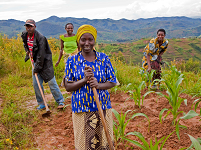As the current crises and disruption in food networks lay bare most African countries’ dependence on food imports, it has become critically urgent to transform the agriculture sector in order to lift vulnerable rural people out of poverty and hunger, according to the African Agricultural Transformation Initiative.
Endowed with a budget of US$19.6 million until 2025, AATI is dedicated to improving sustainable development in Africa by bridging the gap between the formulation of strategic agricultural initiatives and their successful implementation at local level.
Speeding up and strengthening that implementation will have a pronounced impact on improving food security, reducing rural poverty and helping small-scale farmers adapt to climate change.
“Given the scale of the rural economy in Sub-Saharan Africa and its enormous potential, we believe that inclusive agricultural transformation is the most effective way to drive sustainable development,” said Safia Boly, Executive Director of AATI. “AATI will provide support through tailored strategies that will ultimately allow them to realize their full agricultural potential,” added Boly.
This new initiative comes as worrying downward spiral trends of poverty and hunger erase years of steady progress. Africa remains the world region with the highest prevalence of hunger (20%), with a total of 278 million affected by hunger in 2021, according to the latest UN report of The State of Food Security and Nutrition in the World.
The ripple effects of the conflict in Ukraine are compounding the crisis that many African countries are facing due to shocks delivered by the COVID-19 pandemic, climate change-induced weather events and conflict.
This perfect storm is leaving many African countries with little fiscal space to increase their development expenditures, which is heavily affecting the agriculture sector. Poor rural people are the most affected because they are not able to cope with price hikes, as they already spend up to 70% of their income to buy food.
Partnering and learning from each other
AATI is currently launching its first wave covering four countries (Ghana, Kenya, Malawi and Senegal) to accelerate effective and sustainable changes in their food systems, based on their needs, priorities and existing infrastructure.
The initiative will roll out learnings and extend support to other African countries as well as to collaborate with additional partners, making the most of the knowledge generated from key stakeholders. Welcoming this initiative, Dr. Agnes Kalibata, President of AGRA, said: “Despite the progress we have made, many countries have still not achieved the breakthroughs we must see if Africa is to seize its opportunity to develop and prosper. As the impact of climate change on African agriculture grows, we need to double down on investments. AATI will provide the much-needed support to African governments, particularly in creating the conditions to attract much needed private sector investments.”
AATI builds on the experience of several African countries in recent years, including national agricultural transformation agencies, bringing together governments, private sector and civil society to overcome key challenges and help replicate successful delivery mechanisms for agricultural transformations.
“Cooperation among stakeholders is essential to transform their agriculture sector. They can share experiences and learn from each other to overcome similar challenges. Partnering is a key element of this initiative,” said AATI’s Executive Director. “Indeed, AATI looks forward to engaging with countries and partners interested in agricultural transformation,” she added.
This initiative is born as a result of the close collaboration among AGRA, the Bill & Melinda Gates Foundation (BMGF), the UN’s International Fund for Agricultural Development (IFAD) and McKinsey & Company, a global management consulting firm providing pro bono support. AATI’s central office will be hosted by IFAD.
BMGF is providing US$10 million, and IFAD is contributing with US$2 million. The funding gap will be closed by other donors. “McKinsey is proud to be a partner in this initiative by providing pro bono consulting support. We believe that we have a unique opportunity and a responsibility to use our expertise, knowledge, and capabilities to support African countries as they drive their inclusive and sustainable agricultural transformations”, says Acha Leke, Senior Partner and Chairman Africa, McKinsey & Company.

